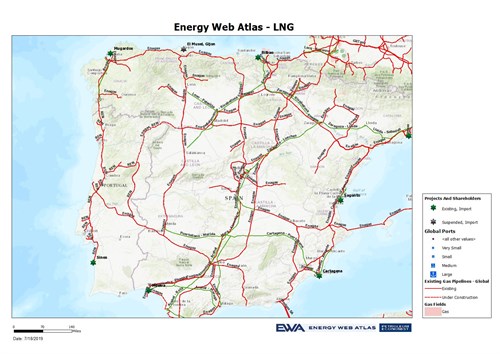In global LNG glut, Spain curbs deliveries as tanks test limits of capacity
Traders in liquefied natural gas (LNG) trying to find the best destination for it in an oversupplied market are having problems delivering into Spain, where storage tanks are already full in anticipation of higher prices later in the year.
 |
| Source: EWA |
The situation, which puzzled some traders expecting strong demand from Spain after they were refused delivery slots at Spanish terminals, illustrates how the global LNG market has been upturned by soaring production in the Atlantic Basin and benign Asian demand.
Storage tanks in regasification terminals typically see fairly swift turnover as LNG is regasified before being sent into the transmission network.
However, importers are increasingly holding off on processing the liquid as they await higher prices, creating a block in the supply chain.
LNG storage tanks at Spain’s three busiest import terminals are expected to be significantly fuller this month and in August than a year ago and close to the brim, according to data from technical manager Enagas.
“When international operators tell you they can’t bring LNG into Spain, it isn’t that there aren’t slots. There is no capacity in the tanks,” said a senior gas trader in Spain.
“There is regasification capacity but the tanks are practically full because operators are playing a contango.”
Contango is the price structure whereby today’s LNG fetches a lower price than in the future, prompting some traders to try to store the fuel where they can and deliver it at a more attractive price later in the year.
“A lot of the guys treat the regasification terminals in Spain as storage; you can pump a lot of cargoes in there. People are long at the moment,” said a European-based trader.
Data from Enagas shows LNG storage tanks at Barcelona, Bilbao and Huelva averaging at 70% in August with peaks above 80% on given days.
Given the size of storage capacities and of cargoes, however, tanks need to be between 15% and 30% empty to absorb the content of a medium-sized 130,000 cubic metre LNG vessel, frequently used, for example, to ship Trinidadian LNG to Spain.
Enagas did not comment on specific requests for slots but said it follows current regulations and protocol, which require it to reject requests from traders for space at the terminals if they are not deemed viable.
“According to the expected schedule, there will be a point this August when the regasification terminals will reach storage levels above 90% of their capacity,” Enagas said in a statement to Reuters.
Spain is part of the Atlantic Basin trade in LNG, which has been inundated with new production from U.S. terminals as well as from Russia’s Yamal facility in the Arctic north.
Not only has supply soared, but with the spread between European gas and Asian spot LNG prices below a dollar per million British thermal unit (mmBtu) since February, few cargoes are heading to Asian buyers, compounding the influx to Europe.
This depressed prices in north west Europe where some import plants are working at close to capacity and gas storage is at multi-year highs, but in recent weeks Spain emerged as an attractive destination as low hydro-power spurred demand.
Having found a bright spot in Europe, however, traders were surprised to be refused delivery slots as others, who stored rather than regasified their LNG, pipped them to the post.
Additional reporting and writing by Sabina Zawadzki; Editing by Jan Harvey

- TotalEnergies and Mozambique announce the full restart of the $20-B Mozambique LNG project
- RWE strengthens partnerships with ADNOC and Masdar to enhance energy security in Germany and Europe
- Five energy market trends to track in 2026, the year of the glut
- Venture Global wins LNG arbitration case brought by Spain's Repsol
- Trinity Gas Storage reaches FID on Phase II expansion



Comments